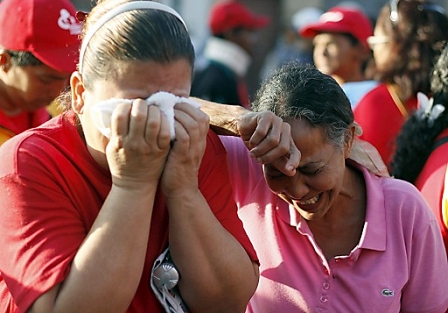Erstellt am: 6. 3. 2013 - 15:26 Uhr
Venezuela mourns Chavez
Subscribe to the Reality Check podcast and get the whole programme after the show.
It didn't really come as much surprise when the announcement came that Hugo Chavez died last night. He had been seriously ill for over a year, and had not been seen in public since traveling to Cuba in December for further treatment for cancer.

EPA/David Fernandez
Just how much he was personally involved with the running of the country since he was diagnosed in 2011 is unclear. maybe his aides have been taking the bulk of the weight for some time, but the loss of the iconic figure of Chavez is bound to change not just the way the country is run, but the way it sees itself, and the way it is seen around the world.
Although a hero to the poor, Chavez was less popular among the middle and upper classes. He was also a divisive figure on the international stage, and his close relationship with Fidel Castro did little to endear him to the United States.
A week of mourning has started in Venezuela, and experts say that the tide of sympathy will almost certainly carry Vice-President, Nicolas Maduro, into office. However, whether he can then establish and sustain political stability in the absence of Chavez remains to be seen. Our South America correspondent, Esther Marie Merz, looks as how the region is responding to the news of Chavez' death.
Dieses Element ist nicht mehr verfügbar
Kenya elections
Amid fears of a repeat of the violence in 2007, tensions have been high around the Kenyan elections. Although this situation has been peaceful so far, the counting is taking longer than expected following technical problems. There have been computer breakdowns and confusions over ballot procedures.
Karen Allen reports from Mombasa as the count continues.
Dieses Element ist nicht mehr verfügbar
Lech Walesa - hero or homophobe?
Poland's revolutionary leader and Nobel peace prize winner, Lech Walesa, has made inflammatory statements that have enraged the gay community and younger voters, but highlight Poland's still deeply conservative attitudes. Adam Easton reports on his statements and how they are being received in different sections of Polish society.
Dieses Element ist nicht mehr verfügbar
The Horsemeat scandal and consumer protection
The Food Standards Agency in Britian is launching an enquiry to find out just how much horse DNA people would find acceptable in their beef. It sounds a bit of a "no brainer", if you come at it from the point of view that when you buy something labelled "beef", if should be all beef and no horse.
However, modern meat processing being what it is, the same machines are usually used for processing different species - so the chances that traces of DNA from something other than a cow landing up in your beef meal are actually quite high. But we are talking about traces of DNA, not great chunks of horsemeat posing as beef - and that, for most people, is the crucial issue.
The European Consumer's organisation are calling for country or origin labelling for all meat products which, they say, will put pressure on the food giants to be more transparent about their supply chains. Their spokesperson, Ruth Vaele, says the emphasis has been on food safety, but now more priority needs to be given to quality - and tougher action taken agains the fraudsters.
Dieses Element ist nicht mehr verfügbar
"Sex and the Citadel"
Sammy Khamis meets Shereen el Feki, whose new book, "Sex and the Citadel" deleves into attitudes to sex in the Arab world.
Dieses Element ist nicht mehr verfügbar
FM4 Reality Check
Monday to Friday from 12.00 to 14.00, and after the show via Podcast or fm4.orf.at/realitycheck.


